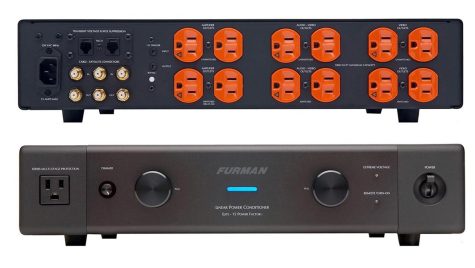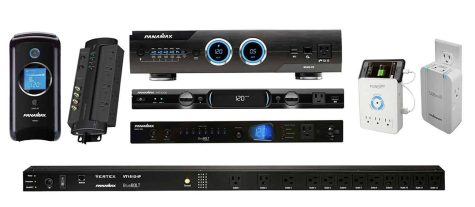What Is A Home Theatre Power Manager? – Beginner’s Guide
January 19, 2023
Home theaters are a decent addition to the television when it comes to enjoying TV shows and favorite movies in the comfort of your home. But to get the optimal experience, you need to invest in expensive electronics. You’ll want items like an AV receiver, speakers, a subwoofer, a projector, and other equipment.
However, these complex setups can be delicate and must be monitored for potential power issues. Power fluctuations often occur during storms or when upgrading the electrical system in your home. They can cause extensive damage to expensive devices that make up a home theater system.
Therefore, it is important to ensure that your home theater always has access to steady power with generators or surge protectors to prevent any damages or costly repairs. A power manager must ensure your theater room stays safe and sound.
What Is A Home Theatre Power Manager?
According to GenderlessVoice, Home theatre power managers lets you to protect your home theater from voltage fluctuations. They can offer tremendous advantages for any home entertainment system. Not only do they protect expensive audio, video, and other home theatre equipment from dangerous electricity fluctuations. They also turn those problematic electrical signals into clean, pure, stable, and noise-free energy.
It increases the performance of each device and extends its lifespan as well. It delivers better sound quality and visuals and is a safer power source for their entertainment system. In addition, power managers reduce overall power consumption by only supplying the necessary amount of energy for a given device.

Advantages Of Power Manager
Home, theatre power managers help in protecting your expensive electronics. Not only does it ensure a clean and safe power supply for all of your equipment, but it drastically reduces noise in the sound system as well.
Whether it’s your TV, computer, or other appliance, installing a home theatre power manager can significantly decrease surge and spike-related risk, all while providing greater operational efficiency.
It also gives you complete control over up to 8 devices, meaning you don’t have to worry about messy wiring and multiple power adapters.
Additionally, managing cables and other wires is much more straightforward when all the equipment runs off a single source. Therefore, it is a wise investment for anyone looking to enhance their electronic audio experience.
Is A Power Manager Necessary For Home Theaters?
A power manager is not necessary if your area or home location has a continuous power supply of regulated electricity.
If you feel that you have invested greatly in a decent home theater, then it is definitely advisable for you to get a power manager.
In case your area has frequent disturbances in the power supply, it could be essential to provide a valuable layer of protection from possible power abnormalities that may disrupt or destroy the system.
They provide filtered sound and also filter out dirty power. This is especially important for keeping your home theater system running smoothly and efficiently. Not only will it improve the sound quality of your speakers, but it can also help protect them from damage caused by dirty electricity.
By installing a power manager, you can enjoy clearer, crisper audio. Also, rest assured that your equipment won’t break down unexpectedly in any way. That’s why having a power manager in your home theater setup is worth considering – it can save you time, money, and effort while ensuring a pleasant overall experience.
Difference Between A Power Manager And A Surge Protector
Power managers and surge protectors perform similar functions as protection devices against voltage surges.
However, while surge protectors are mainly designed to shield electrical equipment against lightning-caused voltage spikes, power managers offer a much more comprehensive level of protection.
Power managers cannot only effectively safeguard against voltage spikes caused by lightning strikes but also regulate AC power quality and remove noise from signals to provide clean power to electronic gadgets in an efficient manner.
Thus, power managers represent a much more reliable and effective solution for protecting electric equipment than traditional surge protectors due to their greater complexity and a broader scope of protection features.

Does A Power Manager Affect Audio Quality?
A power manager is responsible for ensuring a regular voltage supply is provided to the home theater. In general circumstances, it may not affect the audio quality.
There may be some background noise that can be picked up and amplified through the speakers. This low-level noise will generally manifest in a hum, noise, or interference that can reduce overall audio quality.
The only issue is that the power manager can sometimes filter out too much noise, resulting in decreased sound quality. Thus, it is advisable to test the effects of having a power manager installed against the audio without one before deciding whether it is necessary.
What About Computers And Other Electronics?
Power managers can also protect your computer from voltage fluctuation issues. Having said that, most computers use UPSs (uninterruptible power supplies) for backup power, with voltage regulation and noise reduction features.
The power supplies of many modern computers have detailed filters and voltage-regulating capabilities. These advances usually make traditional power conditioners unnecessary for most computer applications.
Final Thoughts
Building a home theatre can be fun but also serious business. Spending the time and money it takes to set up a room with high-end sound systems and projectors doesn’t guarantee that your equipment will stay safe and work in the long run.
Issues related to the power supply and Lightning strikes could pose a threat to your precious digital gear. Voltage fluctuations can cause severe damage to expensive electronics if not dealt with, making it essential for those serious about their home theatre to invest in a quality power manager from a trusted manufacturer.


